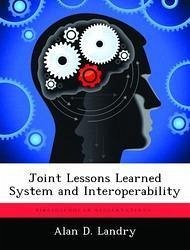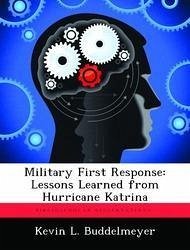Nicht lieferbar

Joint Lessons Learned System and Interoperability
Versandkostenfrei!
Nicht lieferbar
This study analyzes the evolution of the Joint Lessons Learned System. It examines historical evidence of interoperability issues in US joint military operations from World War II to the present. Three major conflicts: World War II, Korea, and Viet Nam, are surveyed to identify basic issues, factors affecting problem resolution, and general trends. Six contingency operations: Lebanon, 1958; Congo, 1964; Dominican Republic, 1965; Cambodia (Mayaguez), 1975; Iran, 1980; and Grenada, 1983, are then examined in similar fashion. This review provides the rationale for an effective, institutionalized ...
This study analyzes the evolution of the Joint Lessons Learned System. It examines historical evidence of interoperability issues in US joint military operations from World War II to the present. Three major conflicts: World War II, Korea, and Viet Nam, are surveyed to identify basic issues, factors affecting problem resolution, and general trends. Six contingency operations: Lebanon, 1958; Congo, 1964; Dominican Republic, 1965; Cambodia (Mayaguez), 1975; Iran, 1980; and Grenada, 1983, are then examined in similar fashion. This review provides the rationale for an effective, institutionalized Joint Lessons Learned System. Based on the evidence, the study then traces the evolution of the Joint Lessons Learned System from 1979 to the present. Primary tools of analysis are two US General Accounting Office Reports issued in 1979 and 1985, recent Congressional documents, the 1986 Goldwater-Nichols Defense Reorganization Act, and interviews with key personnel involved in Joint and Army Lessons Learned Systems. Basic conclusions of the study are: interoperability issues are resistant to resolution; clear patterns of failure exist in critical fields including planning, intelligence, communications, fire support, logistics, airlift, command and control; and lessons learned activities have not been institutionalized in a systematic and cohesive fashion. Resolution of recurring interoperability issues depends on reversal of these trends. The study concludes that increasingly enhanced threat force capabilities are certain to escalate the costs of success in future military operations. The study argues that the defense community should carefully nurture the embryonic Joint Lessons Learned System and move quickly to develop supporting Service Lessons Learned Systems. Cost-effective recommendations are offered which, if implemented, could significantly alter the effectiveness of current lessons learned activities and assure their survival in times of austerity and challenge. This work has been selected by scholars as being culturally important, and is part of the knowledge base of civilization as we know it. This work was reproduced from the original artifact, and remains as true to the original work as possible. Therefore, you will see the original copyright references, library stamps (as most of these works have been housed in our most important libraries around the world), and other notations in the work. This work is in the public domain in the United States of America, and possibly other nations. Within the United States, you may freely copy and distribute this work, as no entity (individual or corporate) has a copyright on the body of the work. As a reproduction of a historical artifact, this work may contain missing or blurred pages, poor pictures, errant marks, etc. Scholars believe, and we concur, that this work is important enough to be preserved, reproduced, and made generally available to the public. We appreciate your support of the preservation process, and thank you for being an important part of keeping this knowledge alive and relevant.











